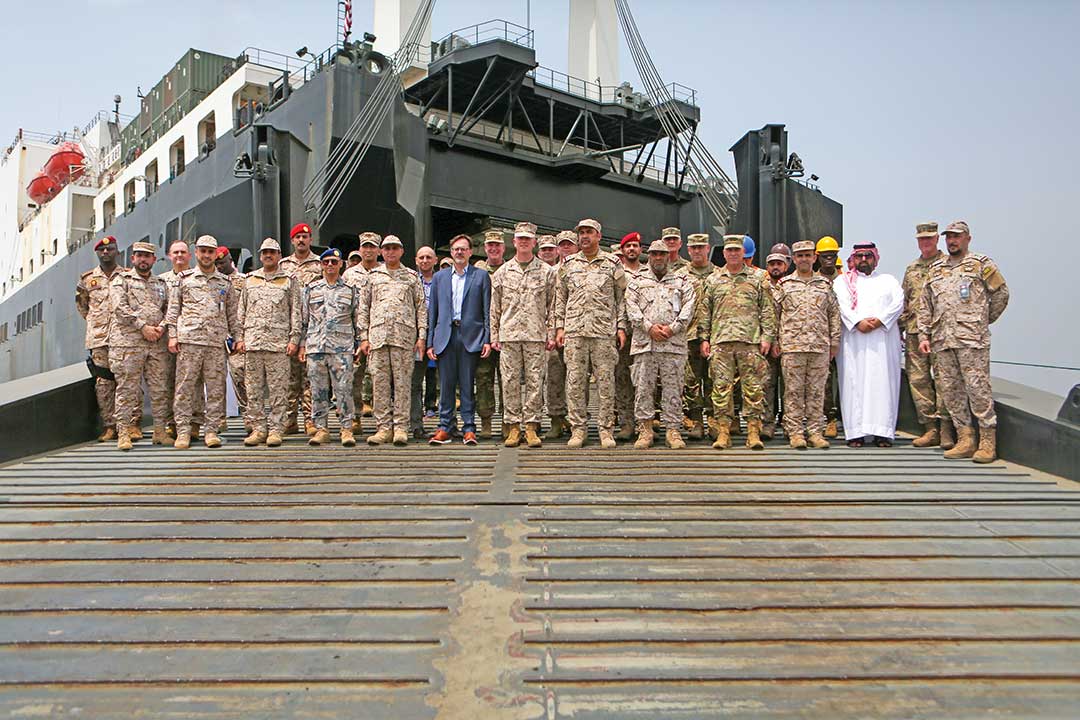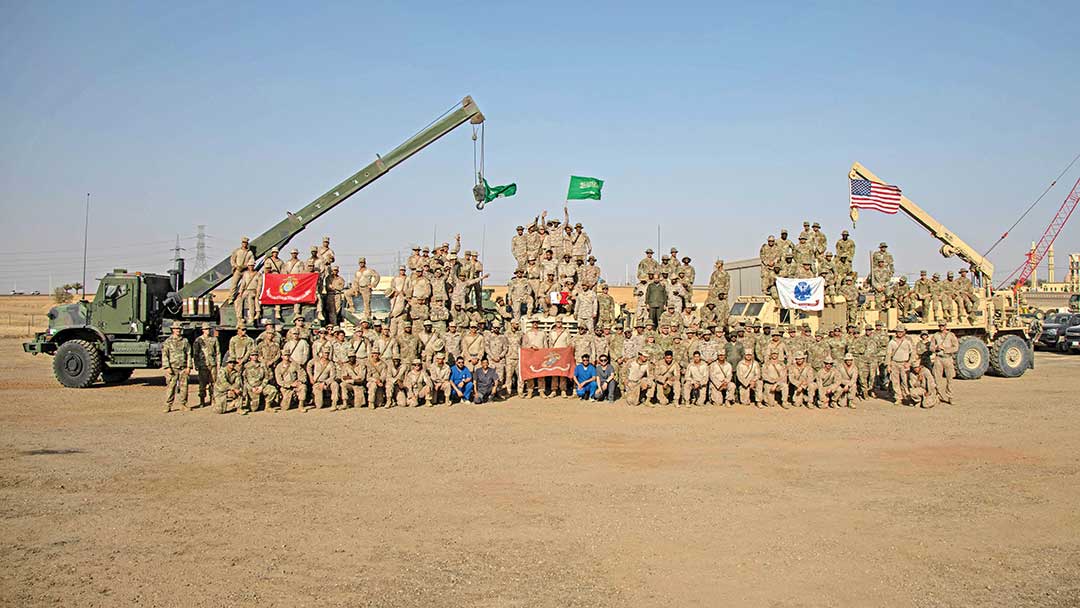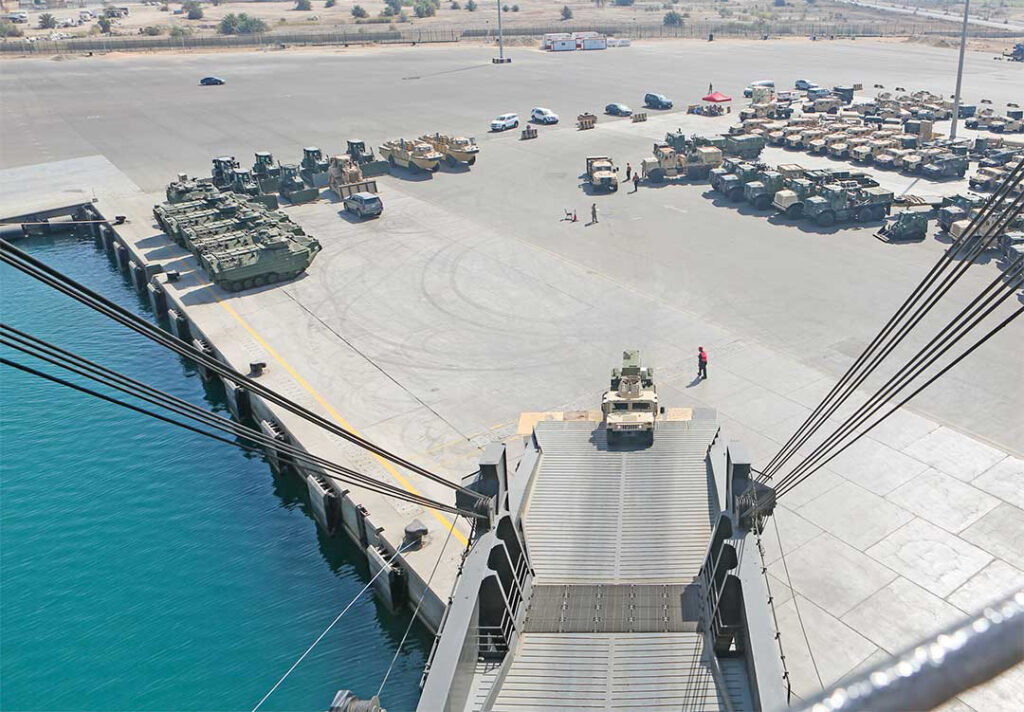UNIPATH STAFF
In a display of military proficiency designed to deter adversaries and reassure partners, Saudi and U.S. troops offloaded an amphibious expeditionary force in the Red Sea port of Yanbu and moved it hundreds of kilometers inland.
It was the latest iteration of the Native Fury military exercise, held in Saudi Arabia in August 2022. Native Fury 22 focused mostly on maritime logistics with the participation of the Royal Saudi Armed Forces and the United States Marine Corps.
More than 1,000 military personnel, many ships, naval vessels, tactical operation centers, and cyber capabilities were involved in the exercise’s eighth iteration at Yanbu commercial ports as well as Prince Sultan Air Base near Riyadh. The exercise focused on demonstrating the rapid landing and integration capabilities of a pre-positioned naval force, and testing the force’s readiness to respond to crises and emergencies in the region. Marines and Sailors assigned to Combat Logistic Regiment 1, 1st Marine Logistics Group and the I Marine Expeditionary Force at Camp Pendleton in California also took part in the exercise.
Native Fury 22 sought to increase the combat effectiveness of the Saudi Armed Forces through military exercises with allies, provide field experience, and unify military concepts and terminology among the multinational participants.
It occurred under the watchful eyes of Commander of the Saudi Western Region Maj. Gen. Ahmed Al-Dubais and a number of senior officers from the Saudi Education and Training Authority, the Western Fleet Command, the Western Region Command, and the Diriyah Joint Operations Center.

U.S. MARINE CORPS
On the American side, then-Commander of Marine Corps Forces Central Command (MARCENT), Maj. Gen. Paul Rock, and a number of senior U.S. military officials along with the U.S. ambassador in Riyadh were present. They toured the sites of the forces participating in the exercise, including the U.S. Navy cargo ship USNS Seay, which offloaded hundreds of military vehicles.
“Native Fury is vital to strengthening the United States’ long-term relationship with the Saudi Armed Forces. It also enhances joint tactics and naval capabilities and supports long-term regional stability,” Maj. Gen. Rock said.
Native Fury is held roughly every two years, and Arabian Gulf countries take turns hosting it. The choice of Saudi Arabia — the first time the country has hosted Native Fury — was a reminder of the importance of that country to the Middle East. “Nothing happens in the region without the Saudis. They’re a major leader in the region,” Maj. Gen. Rock added.
The exercise featured multiple hypothetical scenarios alongside logistics and live-fire exercises between Saudi and American forces. They focused on mobilization, deployment, and logistics, along with communications, first aid, live-fire target practice and supply and evacuation operations.
“The exercise’s maneuvers enhance complementary work and improve the compatibility and combat readiness of Saudi and American forces,” said Col. Matthew Hakola, commander of the U.S. forces participating in the exercise.
Native Fury was not confined to the Armed Forces, but saw participation and support from many Saudi ministries and civilian organizations with the aim of conducting whole-of-government operations. For example, after offloading equipment in Yanbu, troops advanced hundreds of kilometers on Saudi highways, requiring coordination with the civilian sector.

The USNS Seay transported and unloaded more than 600 vehicles and various types of equipment to support a Marine Air-Ground Task Force during Native Fury 22.
One officer explained the mission and operations of the Maritime Prepositioning Force, namely, the rapid deployment and assembly of the Marine Air-Ground Task Force in a secure area by using an air bridge between operating theaters and pre-positioned naval positioning ships.
This type of operation is notable for its speed and versatility as a strategic option for deploying troops and equipment. The Marine Air-Ground Task Force is a combined Marine Corps task force under the leadership of a single commander.
Afterward, senior commanders visited the bridge of the USNS Seay for a briefing on the Marine Air-Ground Task Force’s high capacity to transport, deliver, and unload hundreds of vehicles, tactical operations centers, cyber communication capabilities, and communications networks to support more than 1,000 participants from the Navy and Marine Corps in coordination with the Saudi Armed Forces and the U.S. Army’s 1st Theater Sustainment Command.
Maj. Gen. Rock praised the ability of the Saudi Armed Forces to provide infrastructure and support for the exercise by coordinating the participating forces efficiently and effectively, and employing forces and resources in the region quickly. Troops had geographical access to areas throughout the kingdom’s borders over a range of 1,500 miles. He stressed that the success of the exercise’s activities was proof of strong operational compatibility and a shared commitment to the security and stability of the region.
Unipath interviewed Maj. Gen. Paul Rock, then-commander of Marine Corps U.S. Central Command
Unipath: How does Native Fury 22 improve U.S. and Saudi military capabilities?
Maj. Gen. Rock: Exercises like Native Fury are vital for the strengthening of our partnership with the Saudi Armed Forces through refinement of combined tactics and enhancement of interoperability. This is the 8th iteration of the biennial exercise in 14 years, and the first iteration hosted by Saudi Armed Forces. The operation is a strategic deployment option that is global in nature, naval in character, and suitable for various employment scenarios. Native Fury 22 executed a MPF [Maritime Prepositioning Force] offload operation, with the support of the U.S. Army’s 1st Theater Sustainment Command, on the western commercial port facility at Yanbu and at Al Bayadh on Prince Sultan Air Base. The exercise enabled increased strategic access and refined command and control, conducted Reception, Staging, Onward Movement, and Integration, and exercised the Trans-Arabian Network ground lines of communication.
Unipath: Why is the mil-to-mil partnership with Saudi Arabia important?
Maj. Gen. Rock: MPF operations are a joint force multiplier, providing the combatant commander the ability to employ the flexible capability of the Marine Air-Ground Task Force (MAGTF) to support a multitude of U.S. and combined operations in the region. Our enduring partnership with Saudi Arabia enables MARCENT to effectively execute MPF operations in support of joint force and combined operations in the region.
Unipath: How do exercises like this contribute to regional stability and security?
Maj. Gen. Rock: The Saudi Armed Forces’ effective capability to provide the access and infrastructure to support MPF operations is a demonstration of our strong interoperability and their enduring commitment to the security and stability of the region. Our partnership with Saudi Arabia is ironclad, and we are committed to the continued support to Saudi Arabia’s security.
Unipath: What is your biggest takeaway from working with the Army during this exercise?
Maj. Gen. Rock: The U.S. Army’s 1st Theater Sustainment Command provided the Marines and Sailors with the speed and efficiency that is a hallmark of their illustrious history. Their logistical support to Native Fury allowed for continuous port operations as a joint force multiplier, which enables the USCENTCOM combatant commander the flexibility to task the MAGTF to support a variety of missions in support of U.S. and regional partner operations.
Unipath: How do you explain the importance of this event to a grandmother who is watching back home?
Maj. Gen. Rock: Native Fury 22 is an operation that is a strategic deployment option for our Marines and Sailors. It is global in nature, naval in character, and suitable for various employment scenarios. Beyond training, the exercise allowed Marines and Sailors the opportunity to work with the Saudi Armed Forces, learn about their culture, and even eat a few traditional meals together. Exercises like this are vital for strengthening the United States’ partnership with the Kingdom of Saudi Arabia by refining combined tactics and enhancing interoperability. Strong partnerships help multiply the USCENTCOM’s ability to support regional security, deter malign actors and rapidly resource partners in the region.

